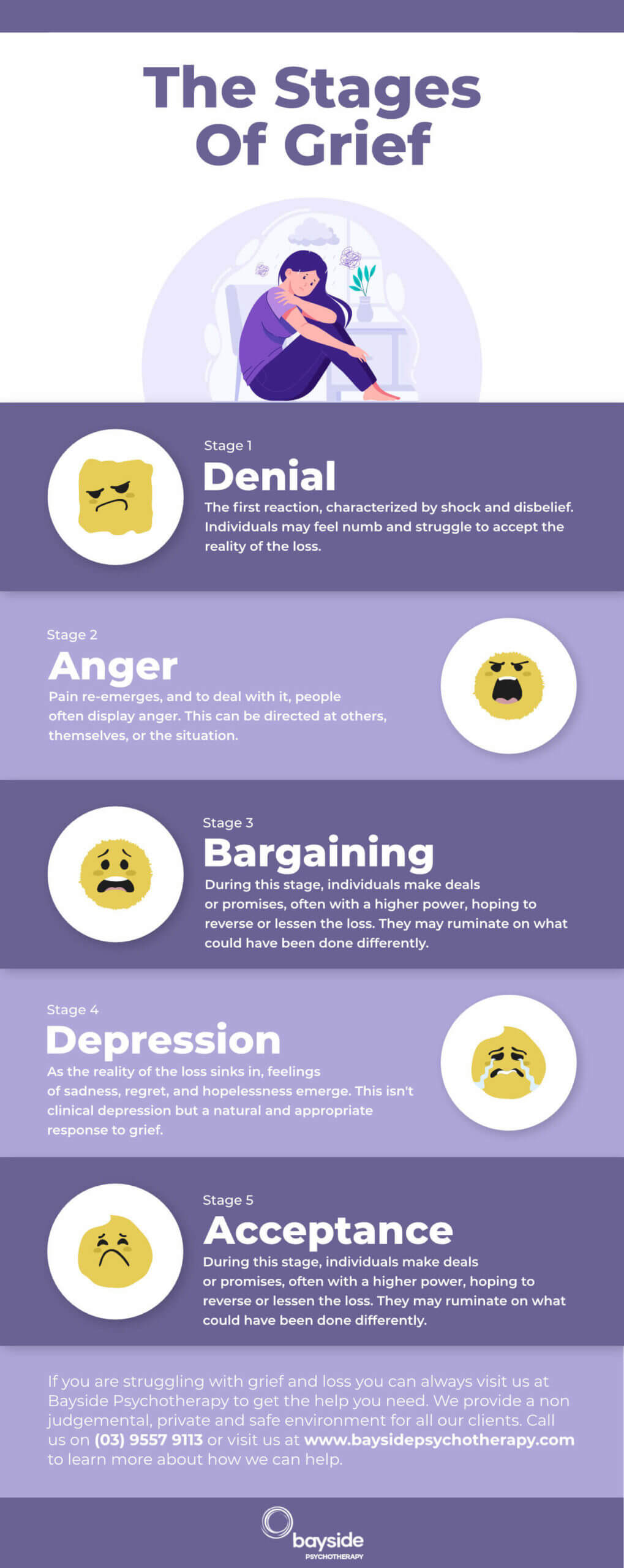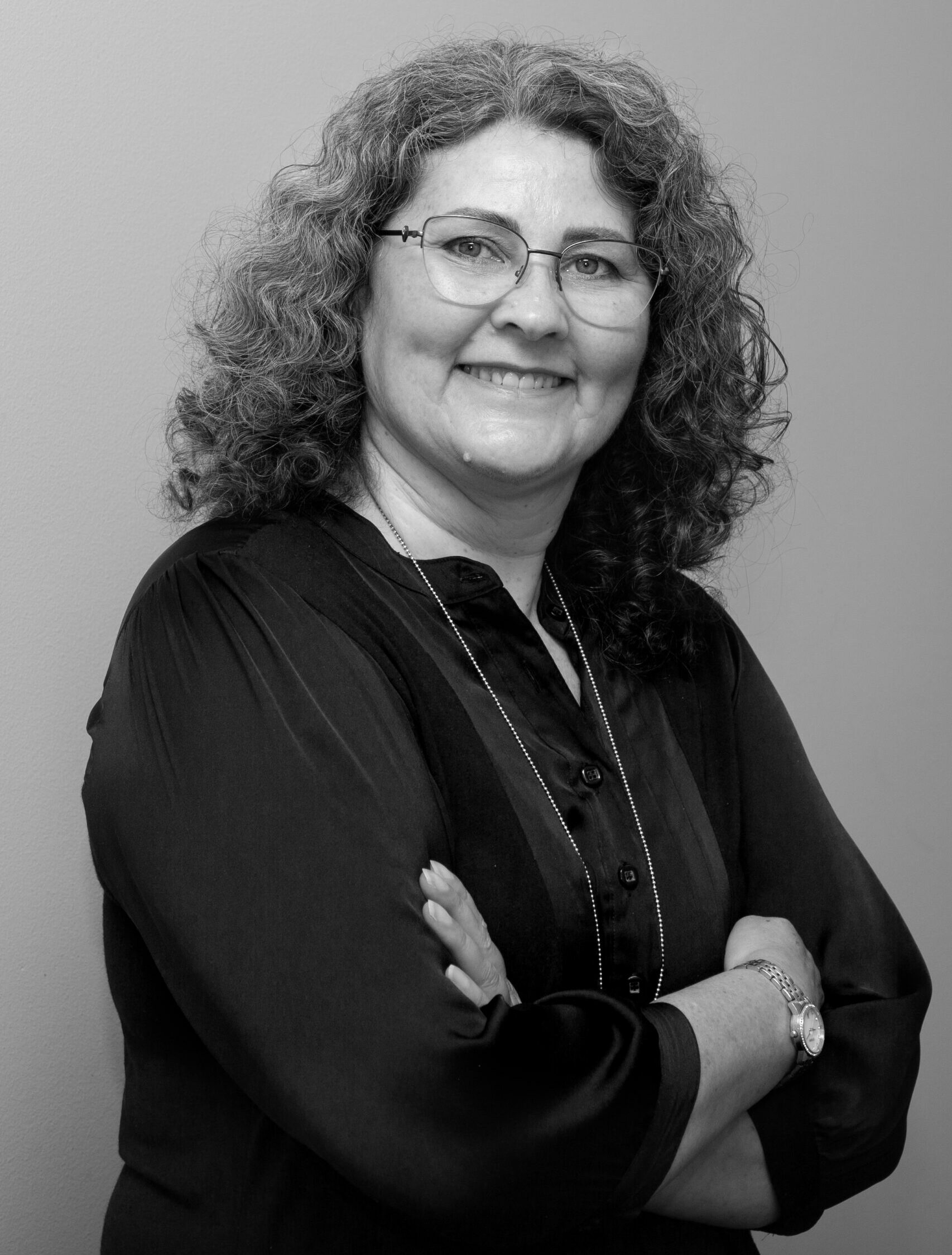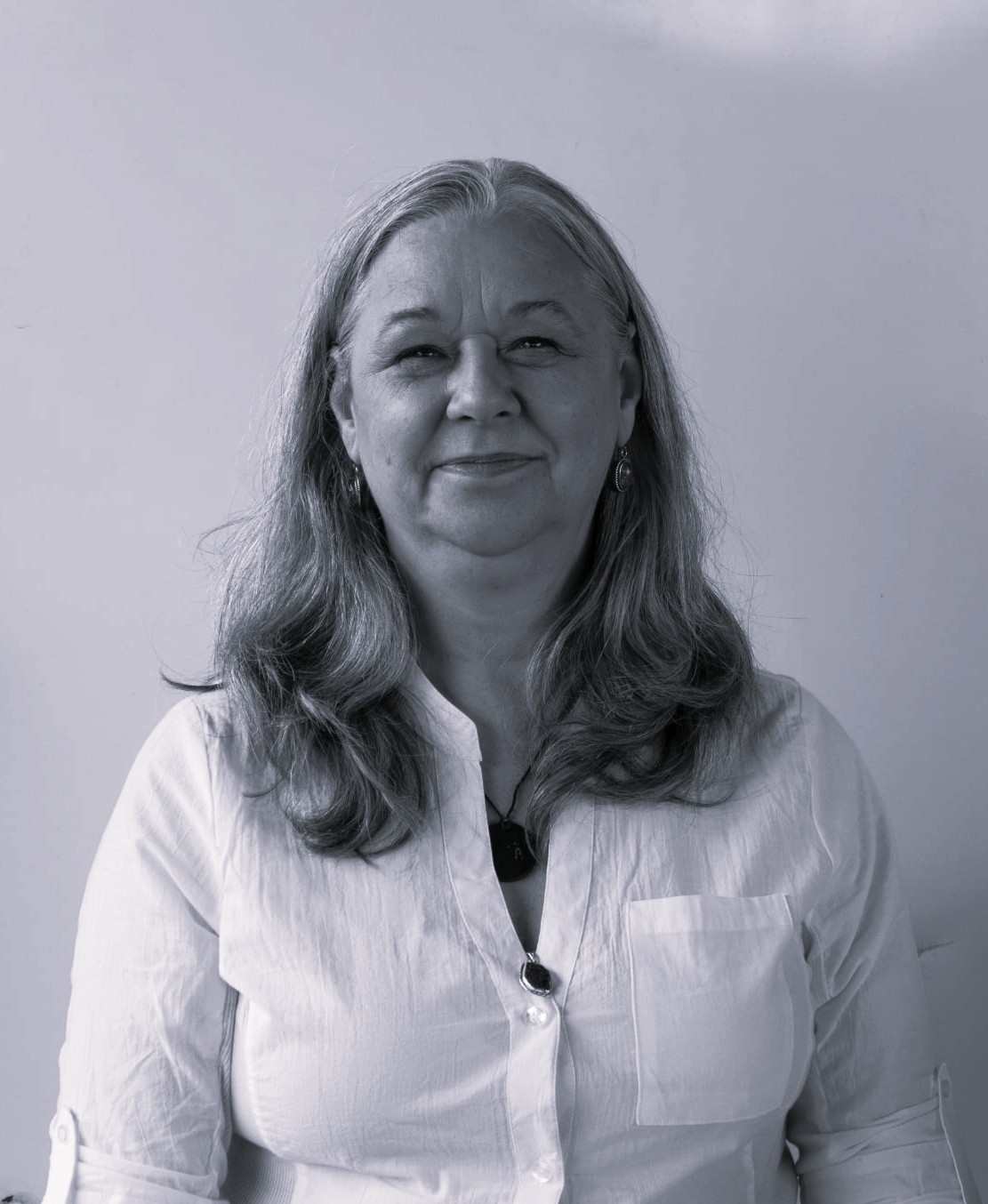Are you struggling to cope with the death of someone close? Or has unprocessed grief from the past come back to trouble your thoughts? Are you struggling to cope with your grief? Whatever form of grief you’re struggling with, your feelings need to be validated and processed appropriately. And it may be hard to come to terms with your loss on your own.
The trained therapists at Bayside Psychotherapy have experience with grief & loss counselling and support, no matter your circumstance our professional mental health counsellors can offer a supportive and understanding environment. We can work together to tailor a grief support approach that suits you.

What Are The Stages Of Grief And Loss?
Depending on which theory you read, the most commonly cited stages are denial, anger, bargaining, depression and acceptance, other theories involve as many as 12 stages. In any case, to live is to experience loss, and the logical outcome of loss is grief.
Loss and trauma are not just confined to major events like the loss of a loved one or life transitions. Just growing up involves loss, as do misunderstandings resulting from the imprecise language we are immersed in — leading to the loss of hope or ideals. Misunderstandings can be traumatic and cause major issues for families and communities.
People are typically ill equipped to deal with the pain caused by loss. We can be reluctant to give up the idea that we’re entitled to be compensated in some way for the losses we believe were inflicted upon us. Such thoughts and feelings can have negative consequences. It implies the hope that someone else can make us whole again, or at least fill the gap left behind by the loss we feel was unjustly inflicted on us.
The problem is that this debt we believe we’re owed can never be satisfactorily repaid. And it’s rarely very clear who’s at fault. Thus perhaps the most important and difficult stage in a grieving process is acceptance — not some intellectual recognition but a fundamental reversal of a rigid, aggrieved perception of the world. This reversal is no easy task, especially without help.

Understanding Grief, Mourning, and Bereavement
Everyone who cares about anything will experience grief eventually. Losing a loved one, a parent, a pet, a prospect, a pregnancy — experiencing a loss can trigger intense sadness, anger, anxiety, loneliness, confusion and emptiness. Grief can confuse us or make us feel numb, and sometimes it can make us question our life priorities and values.
Avoiding expressing feelings of grief and loss can take a severe toll on our mental health. We may initially feel that it’s best to suppress any emotional feeling and try to move on, but if we fail to take care of our mental health those deep seated feelings can present later in life and we can experience intense sense of pain and loss.
Unfortunately, our modern society is not skilled in understanding and dealing with the effects of grief and loss, the ongoing painful emotions, distress and harm that accompany them. We’ve lost many of the vital customs and rituals that traditional cultures used to process loss, particularly in the case of death.
Inadequate grieving can result in an experience called ‘complicated grief’, later in life: Grief that is delayed and condensed from being repressed can deliver consequences of anxiety, depression, musculoskeletal conditions and even digestive disturbances.
our self-hypnosis MP3 recording for grief and loss, which may complement your therapy in your own time.
We Can Help You Deal With Grief & Loss
Grief is not an “illness.” Your experience of grief and loss is unique, and might even feel overwhelming, but it is not insurmountable. Grief is our inbuilt way of dealing with the inevitable losses in life. It is a healing and natural process that should in the natural course of things leave you free to pursue other relationships and new avenues in life.
In your first counselling session, we aim to learn more about your experience and how we may be able to help you. We will help you to feel safe in the room, make sure you connect with your grief counsellor and work together to set goals for your treatment. We aim to help you to expand your feelings of safety in your sessions into the rest of your life, so you honour your feelings of loss and grief without being overwhelmed by them. A combination of mindfulness therapy and psychoanalytic psychotherapy tailored to the client is one approach our therapists have found that may be effective for your grief counselling.

How Long Until I Feel better?
Grieving, and psychotherapy, are both more of a process than a fixed destination. However, many people report finding that the act of seeking help is often all it takes to give you a glimpse of the light at the end of the tunnel. After a few sessions, your therapist will be able to evaluate how well your counselling is working. We may then get a clearer idea of how many more sessions might be indicated to help you come to accept your loss. Recovery from complicated grief is likely to take more time because of its complex nature, and the additional psychological and physical symptoms that can develop.
Need grief counselling?
Find your therapist
Connect With a Therapist
How Does Bayside Psychotherapy Treat Grief and Loss?
We don’t believe that people can just “get over” their loss through an effort of will. Processing grief takes delicacy and compassion, and a deep understanding of human nature. Our therapists’ training in counselling, psychotherapy, hypnotherapy, and Buddhist psychotherapy provides us with a wide range of tools to draw on to support you through your grieving process. Even if you’ve tried counselling before without success, you might find our gentle, flexible blend of Eastern and Western therapies is a good fit for you.
It takes courage to start grief counselling, and it might be the most important thing you do for yourself and your family if you’re struggling to cope.
Please call us on (03) 9557 9113 or use our online form to make an appointment for an initial session, either at our Highett clinic or remotely from the comfort of your home. Your call is completely confidential, and there’s absolutely no obligation to proceed.
Our targeted self-hypnosis MP3 recording for grief and loss can be downloaded here if you’d like to possibly get a head start on your therapy.
What Is Grief Counselling?
Grief Counselling is a form of counselling or psychotherapy that is delivered by a practitioner whose goal is to help people cope with the grief associated with losing someone or something. Sometimes the pain of losing someone can be more than a person can manage, which triggers a range of conflictual and intense feelings.
Grief comes in many forms, for example, you may not have experienced the death of a loved one, but perhaps a child has moved out of the home; your divorce has been finalised and you are alone for the first time in many years, or you have lost a job that kept you financially stable. As such, a grief counsellor will be the person that you can talk to and who can help you navigate through the strange and unprecedented time you are going through.
Do I need Grief Counselling?
Have you lost someone and find yourself feeling overwhelming sadness, loss, or grief? Or do you feel unable to let go and move on? Perhaps you are suddenly realising you are processing grief from the past? If so, our highly trained psychotherapists at Bayside Psychotherapy are here to support you through it.
Engaging a Grief Counsellor is an important step in being able to come to terms with the loss in your life, no matter how recent or long ago. Our team has experience in treating grief-related trauma via several methods of support and treatment plans and can tailor an individual plan to support your unique needs.
When Should I Consult a Grief Counsellor?
Our grief and loss counsellors will consult with you via video conferencing or face to face and will guide you through mindfulness therapies (depending on which therapist you engage) to assist you to process how you feel in a safe space and without judgement. Grief is naturalistic and not an “illness” as such.
In your initial session, your grief and loss counsellor will seek to build a rapport with you, to see if you both click. They will help you to feel safe and comfortable so you can be with your feelings of loss and grief without feeling too overwhelmed to speak. Therapy and psychoanalytic psychotherapy are delivered via a tailored style rather than a scripted method to suit your unique experience.
In your initial session, your grief and loss counsellor will seek to build a rapport with you, to see if you both click. They will help you to feel safe and comfortable so you can be with your feelings of loss and grief without feeling overwhelmed. Therapy and psychoanalytic psychotherapy are delivered via a tailored style rather than a scripted method to suit your unique experience. Even if you’ve tried other forms of grief and loss counselling in the past, our unique combination of both Eastern and Western therapies means you’ll have a good chance of recovery.
Seeking Professional Advice
Seeking professional help can help begin the process of understanding grief, there is no right or wrong way to deal with grief as everyone experiences it in different ways. Working closely with a health care specialist can be emotionally rewarding. The therapists at Bayside Psychotherapy are here to help you with grief and loss counselling, either in person at our Highett clinic or remotely, via a secure, compassionate online service.
Do you have any questions for us? Get in touch with us through our online contact form.
Call Bayside Psychotherapy on (03) 9557 9113 to find out if we’re able to help you. Your call is completely confidential, and there’s absolutely no obligation.
You can also book an appointment by using our online booking form for online appointments. Or, if you prefer, you can book an in-clinic session.
Note: Whilst we will do our best to assist you, we rely upon your commitment to and participation in the treatment process to optimise results. Although some of our therapists work with people presenting with this condition, no guarantees of any outcomes can be made.










